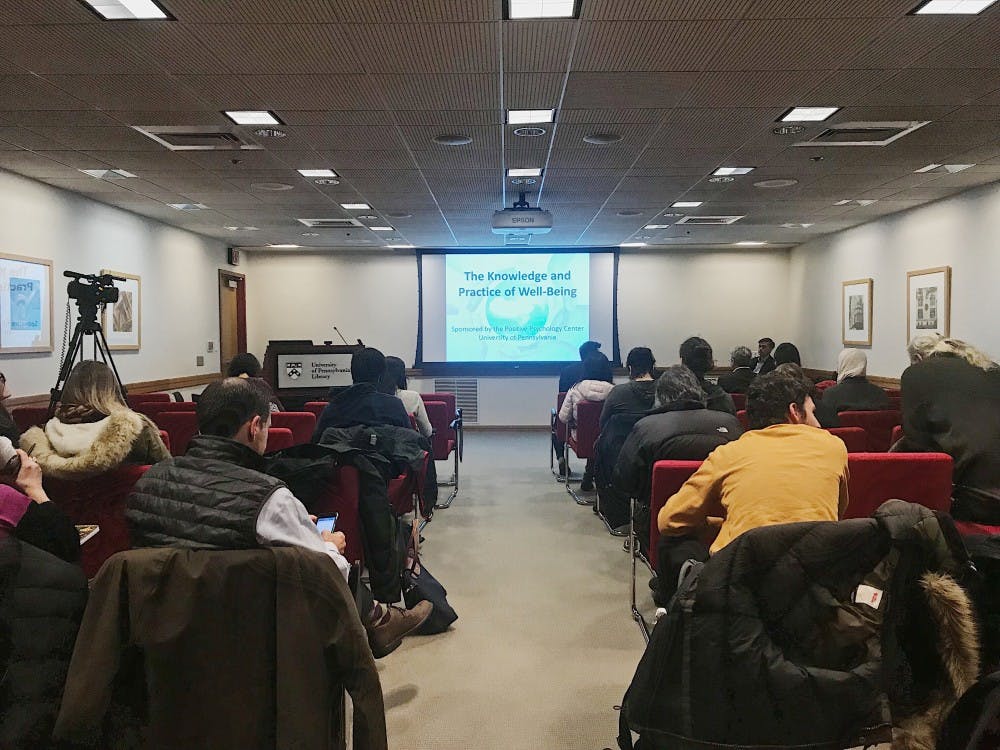
Members of the Penn community braved the snowy weather and gathered at Van Pelt Library for the teach-in event “The Knowledge and Practice of Well-Being" on March 20.
The event was sponsored by Penn's Positive Psychology Center and was a part of the week-long teach-in, which is the first of its kind to be held in 49 years. Guest speakers discussed how to address common stressors in college with practices of well-being and mindfulness. They also led interactive activities and thought experiments to spur participation from attendees.
Director of Education in the Positive Psychology Center James Pawelski first explained the many ways one can define, measure, and ultimately cultivate happiness. Pawelski emphasized that each individual has their own sense of happiness and therefore has their own ways of accomplishing that happiness.

Another speaker, Penn Medicine professor and Director of the Penn Program for Mindfulness Michael J. Baime, spoke on practicing and achieving mindfulness. As he explained, mindfulness is a way of training and improving one’s attention capacity and working memory.
Baime urged the audience to bring their attention to the present moment. While this may seem like a bad idea in college with so many stressors present, he said the practice is ultimately helpful. Mindfulness "buffers" a stress reaction, so people can really process the source of stress, he added.
Finally, Penn Program for Flourishing co-founders Faisal Khan and 2014 Arts and Sciences graduate Laura Taylor presented on how positive psychology-based programming can benefit students.

Michael J. Baime
Khan, a 2011 Engineering and Wharton and 2017 Arts and Sciences graduate, explained that students have voiced a need for wellness initiatives. “Penn is, in many ways, the birthplace of positive psychology,” he said. “We also discovered that there is a need for this at Penn as well. Students expressed an interest to be in a safe place and a safe environment where they can develop and grow without any preconceived [negative] notions.”
Despite being one of the only Ivy League institutions with a Positive Psychology Center, Penn does not yet provide large-scale classes in the field to undergraduate students. At Harvard University and Yale University, a positive psychology class was their most popular class among students.
Taylor said the availability of the Penn Program for Flourishing to all Penn students addresses the importance of inclusion to wellness. “I think the exclusivity that happens in many of the programs at Penn can cultivate competition,” she told The Daily Pennsylvanian. “We are trying to find a way of creating a space that will promote a more collaborative mindset.”
To incorporate positive psychology in everyday life, Taylor said that starting small, first by focusing on one's strengths, is the best path to "sustainable change" in one's happiness.
Attendee and Engineering sophomore Sanjit Kalapatapu said the discussion on mindfulness really spoke to him. “It is something that I do not really think about that much,” he said. “I feel at Penn you kind of get swept into the swing of things. You do not get to really sit down and reflect.”
Arts and Sciences master's student Noof Aljneibi, who is getting her master's degree in Applied Positive Psychology, added that events like this one should be more commonplace on college campuses. “Having more sessions spreading awareness about well-being and human flourishing is really crucial,” she said, “not only at Penn but in every community.”
“The Knowledge and Practice of Well-Being” is just one of several events scheduled on campus for the teach-in initiative, which will also include several lectures on politics and Penn culture. This is the first teach-in program since 1969. This revival of the program, titled “Production of Knowledge,” is scheduled to run through March 22.
The Daily Pennsylvanian is an independent, student-run newspaper. Please consider making a donation to support the coverage that shapes the University. Your generosity ensures a future of strong journalism at Penn.
Donate



